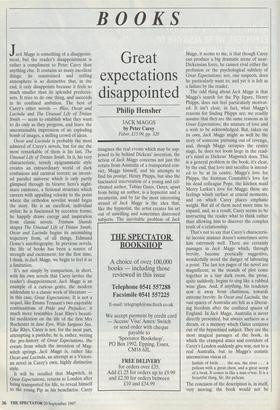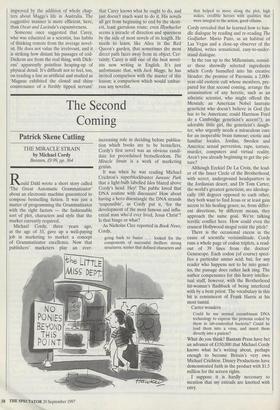BOOKS
Great expectations disappointed
Philip Hensher
JACK MAGGS by Peter Carey Faber, £15.99, pp. 328 Jack Maggs is something of a disappoint- ment, but the reader's disappointment is rather a compliment to Peter Carey than anything else. It contains so many excellent things; its constrained and stifling atmosphere is so distinctive that, in the end, it only disappoints because it feels so much smaller than its splendid predeces- sors. It tries to do one thing, and succeeds in its confined ambition. The best of Carey's other novels — Bliss, Oscar and Lucinda and The Unusual Life of Tristan Smith — seem to establish what they want to do only as they progress, and leave the uncontainable impression of an exploding bomb of images, a milling crowd of ideas.
Oscar and Lucinda is probably the most admired of Carey's novels, but for me the most remarkable of them is his last, The Unusual Life of Tristan Smith. In it, his very characteristic, tersely epigrammatic style creates an extraordinary world of dark confusions and carnival terrors; an invent- ed parallel universe which is only partly glimpsed through its bizarre hero's night- mare existence, a fictional structure which careers with appalling velocity to the point where the orthodox novelist would begin the story. He is an excellent, individual stylist; he is fascinated by eccentric forms; he happily draws energy and inspiration from classic novels. Tristram Shandy shapes The Unusual Life of Tristan Smith; Oscar and Lucinda begins its astonishing trajectory from, of all things, Edmund Gosse's autobiography. In previous novels, the life of books has been a source of strength and excitement; for the first time, I think, in Jack Maggs, we begin to feel it as a limitation.
It's not simply by comparison, in short, with his own novels that Carey invites the reader's disappointment. Jack Maggs is an example of a curious genre, the modern addendum to a classic work of literature in this case, Great Expectations. It is not a sequel, like Emma Tennant's two enjoyable continuations of Pride and Prejudice; it much more resembles Jean Rhys's beauti- ful meditation on the life of the first Mrs Rochester in Jane Eyre, Wide Sargasso Sea. Like Rhys, Carey is not, for the most part, attempting a pastiche; he is, rather, writing the pre-history of Great Expectations, the events from which the invention of Mag- witch springs. Jack Maggs is, rather like Oscar and Lucinda, an attempt at a Victori- an novel in Carey's own, highly distinctive style. It will be recalled that Magwitch, in Great Expectations, returns to London after being transported for life, to reveal himself to the young Pip as his benefactor. Carey imagines the real events which may be sup- posed to lie behind Dickens' invention, the action of Jack Maggs concerns not just the return from Australia of a transported con- vict, Maggs himself, and his attempts to find his protégé, Henry Phipps, but also the fascinated intervention of a young and cel- ebrated author, Tobias Oates. Oates, apart from being an author, is a hypnotist and a mesmerist, and by far the most interesting strand of Jack Maggs is the idea that, like the hypnotist, the artist creates his art out of unwilling and sometimes distressed subjects. The inevitable problem of Jack Maggs, it seems to me, is that though Carey can produce a big dramatic scene of near- Dickensian force, he cannot rival either the profusion or the psychological subtlety of Great Expectations; nor, one suspects, does he particularly want to; and yet it is felt as a failure by the reader.
The odd thing about Jack Maggs is that Maggs's search for the Pip figure, Henry Phipps, does not feel particularly motivat- ed. It isn't clear, in fact, what Maggs's reasons for finding Phipps are; we readily assume that they are the same reasons as in Great Expectations, the mixture of love and a wish to be acknowledged. But, taken on its own, Jack Maggs might as well be the story of someone pursuing out of revenge, and, though Maggs occupies the centre stage, he does not loom large in the read- er's mind as Dickens' Magwitch does. This is a general problem in the book; it's clear, by the end, that love and sacrifice is intend- ed to be at its centre. Maggs's love for Phipps, the footman Constable's love for his dead colleague Pope, the kitchen maid Mercy Larkin's love for Maggs; these are feelings which surface at crucial moments, and on which Carey places emphatic weight. But all of them need more time to expand, and, as a result, Carey seems to be instructing the reader what to think rather than allowing him to discover the complex truth of a relationship.
That's not to say that Carey's characteris- tic laconic manner doesn't sometimes serve him extremely well. There are certainly passages in Jack Maggs which, through brevity, become poetically suggestive, wonderfully avoid the danger of labouring a point. The last ten pages of the novel are magnificent; as the strands of plot come together in a tiny dark room, the prose, quite suddenly, begins to sing like a rubbed wine glass. And, if anything, his tendency now is away from chattiness, towards extreme brevity. In Oscar and Lucinda, the vast spaces of Australia are felt as a liberat- ing freedom after the confined spaces of England. In Jack Maggs, Australia is never directly presented, but always surfaces as a dream, or a memory which Oates conjures out of the hypnotised subject. They are the most magical passages of the book, in which the cramped attics and corridors of Carey's London suddenly give way, not to a real Australia, but to Maggs's ecstatic unconscious vision of
hatfuls of bifds . . . the sea, the river . . . a pelican with a great chest, and a great scoop of a beak. It comes in like a man o'war. It is a beautiful thing, Sir, the pelican.
The concision of the description is, in itself, very moving; the book would not be improved by the addition of whole chap- ters about Maggs's life in Australia. The suggestive manner is more efficient, here, than Oscar and Lucinda's expansiveness.
Someone once suggested that Carey, who was educated as a scientist, has habits of thinking remote from the average novel- ist. He does not value the irrelevant, and it is striking how distant his passages of cod- Dickens are from the real thing, with Dick- ens' apparently pointless heaping-up of physical detail. It's difficult not to feel, too, on reading a line as artificial and studied as `Magnus exhibited the closed and shiny countenance of a freshly tipped servant' that Carey knows what he ought to do, and just doesn't much want to do it. His novels all get from beginning to end by the short- est, least garrulous route; even Illywhacker seems a miracle of direction and spareness by the side of most novels of its length. He needs to learn, like Alice in the Red Queen's garden, that sometimes the most direct path faces away from its object. Cer- tainly, Carey is still one of the best novel- ists now writing in English. It's just unfortunate that, with Jack Maggs, he has invited comparison with the master of this lesson; a comparison which would embar- rass any novelist.



































































 Previous page
Previous page